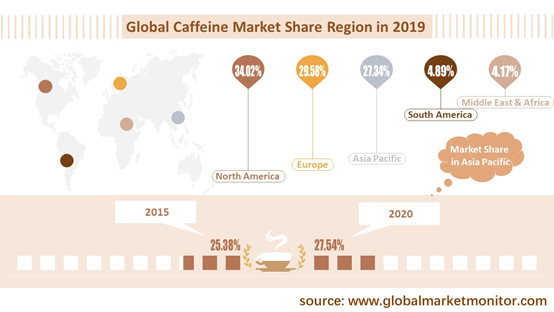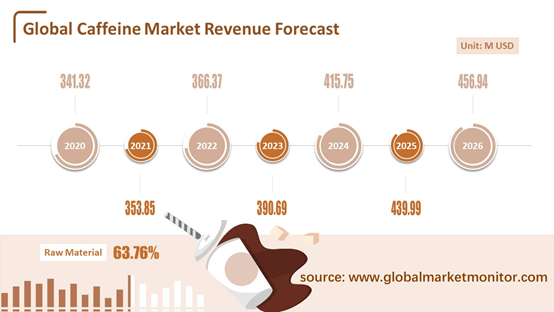Caffeine is a xanthine alkaloid compound, as well as a central nervous system stimulant to temporarily drive away sleepiness and restore energy. It is clinically used to treat neurasthenia and coma recovery. Therefore, caffeine is the most commonly used psychotropic drug in the world. In addition, adequate caffeine intake can also reduce the risk of cardiovascular disease and diabetes. Coffee, tea, cola and various functional drinks contain more or less caffeine, and these drinks are very popular. However, many studies have proved that caffeine intake has certain negative effects. Once caffeine is ingested excessively, it will cause gastrointestinal discomfort, nervous system disorders, and elevated blood pressure, which is harmful to the human body.
There are two main types of caffeine: synthesized caffeine and natural caffeine. Synthesized caffeine is absorbed through the digestive system much faster than natural caffeine and reaches its peak faster. Its production cost is cheaper than natural raw materials, therefore, it is more common in bottled beverages and food, with a market share of 84.26% in 2019. The natural caffeine in coffee, tea and chocolate is much less than the synthetic caffeine in many other products. These vitamins and methylxanthines balance the rise and fall of caffeine in the human body system and help it to be delivered to the body in a stable manner. It can promote a sustainable energy boost better than synthetic caffeine, clear thinking and focus longer. Although it is almost impossible to distinguish between synthetic caffeine and natural caffeine at the molecular level, the production method of synthetic caffeine is very worthy of attention.
Caffeine exists in many plants and can be synthesized and added to certain foods and beverages. It is beneficial for alleviating fatigue and pain, so it is well received by the public. In the global caffeine application field in 2019, food and beverage accounted for 69.03%. Caffeine can also be used in the pharmaceutical and beauty industries. It can make people clear-headed and energetic. Therefore, more and more cosmetics companies have joined the ranks of developing coffee products. In addition, the caffeine in analgesics can improve its efficacy. Nowadays, caffeine is also used in many nutritional health products. Anhydrous caffeine is becoming more and more popular as a supplement to lose weight and improve athletic performance.
Prospects Analysis of the Caffeine Industry in Various Regions Under the Influence of COVID-19
After years of development and market adjustment, the scale of caffeine production has continued to expand, the process has been improved year by year, the product quality has been steadily improved, the production cost has dropped significantly, and the competitiveness of various enterprises has become stronger and stronger.
Get the Complete Sample, Please Click: https://www.globalmarketmonitor.com/reports/762574-caffeine-market-report.html

In North America, 90% of adults use caffeine every day. The region has a vast market and is the largest revenue market, with a market share of 35.58% in 2015 and a market share of 34.02% in 2019, a decrease of 1.56%. Europe and the Asia-Pacific region ranked second and third with a market share of 29.58% and 27.34% in 2019. The Asia-Pacific region has been the fastest growing region in recent years. With the rapid economic development and the improvement of human consumption levels of the developing countries in this region, its caffeine market is expected to further expand.
In 2020, affected by COVID-19, countries have adopted temporary control measures to deal with the epidemic. These measures not only prevented the spread of the disease, but also affected logistics and transportation. As the largest exporters of caffeine in the world, economies of Germany and India have been severely affected by COVID-19. For importing countries, taking into account the COVID-19 epidemic, the customs of various countries have extended the inspection procedures for imported goods, which will also affect the delivery of caffeine. Therefore, the growth rate of the global caffeine market will slow down in 2020.
The Global Caffeine Market Will Tend to Develop Moderately
The current trend of economic globalization has prompted multinational companies to make structural adjustments on a global scale. Since caffeine and other chemical raw materials have been produced for many years, the process technology is quite mature, and does not involve intellectual property issues, so caffeine is a huge potential market. Synthesized caffeine contains residues of chemical raw materials, and long-term consumption will produce certain residual toxicity. Now, some countries in the world have banned the use of chemically synthesized caffeine in beverages. In recent years, caffeine extracted from natural plants has become more and more popular in the market, and the products are often in short supply. The market demand will continue to increase in the future with a broad prospect.
However, in terms of the production cost analysis of caffeine, its market development is mainly restricted by raw materials, accounting for 63.76%. Caffeine is only purchased in certain parts of the world, so the cost of raw materials is higher, and its labor costs are also higher.
The increase in personal consumption of caffeine beverages is the main factor driving the growth of the global caffeine market. The increase in health awareness and participation in sports activities of the people of all countries are also factors that promote the growth of the global market. In addition, the use of caffeine in medicines is increasing, which is another factor that is expected to promote the growth of the global caffeine market in the near future.

In 2015, the global caffeine industry market was valued at USD 252.86 million, which increased to USD 332.96 million in 2019. The caffeine market is facing continuous demand from the global market. Therefore, we predict that by 2026 its market value will be worth US$456.94 million.
Get the Complete Sample, Please Click: https://www.globalmarketmonitor.com/reports/762574-caffeine-market-report.htmlWe provide more professional and intelligent market reports to complement your business decisions.